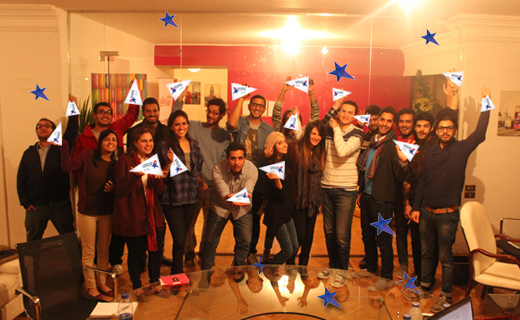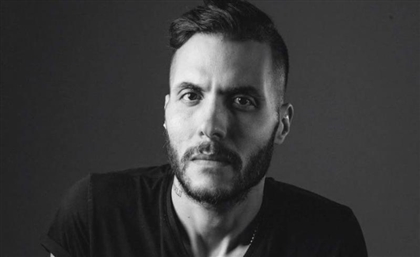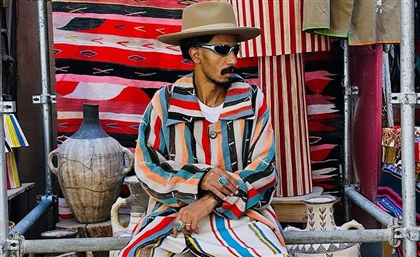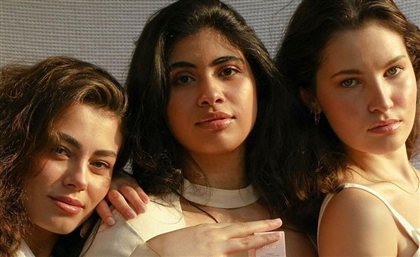TSN - The Star Makers
A factory for television talent, TubeStar Network emerged after the success of parent company QSoft's Al Bernameg, choosing 10 finalists from thousands of online submissions, including our very own El Scene, to turn into stars. We find out more...

In March 2011, QSoft, a small production team, began filming a middle aged man in his laundry room, ranting about the revolution. In 2013, that man became one of Time's most influential people on the planet. The show at the time was called B+, named after the presenters blood type, and was uploaded to YouTube. That man of course was Bassem Youssef, the programme became Al Bernameg, and the rest, as they say, is history.
Following the unparalleled success of the infamous political satirist, QSoft decided to make the bold risk to invest their finances in giving absolutely unknown personalities a chance at the same cosmic trajectory to fame with their new enterprise, TubeStar Network. After thousands of submission videos, the YouTube partner selected the top ten, for which they'd fully produce three pilot episodes for each, with a hope of selling them on to TV networks or at least finding sponsorship to continue as an online series. The top ten also experienced a crash course workshop in everything it takes to make a hit show, headed by professionals in the industry which is in line with one of TSN’s main motives; to nurture, educate and incubate the stars of the future.
The top ten series that are being produced from their first cycle of submissions are hugely diverse including a Top Gear-style show reviewing cars in the Middle East and a parkour team from Alexandria, to a satirical football show and a Hip-Hop show, as well as a series that follows a couple of obnoxious Egyptian kids that can’t speak Arabic, running around big events and pissing off important people, otherwise known as our very own El Scene.
Following the release of the first couple of episodes from cycle one and before the second cycle of submission begins, we sat down with the whole group at TSN - Amr Assaid (Creative Director) Yasser Ghazi (Chief Operations Officer), Maha Eissa (PR & Media), Tamer Alfons (Marketing executive), Nourhan Ghazi (Social Media Executive), Nevin Nadi (Assistant Production Manager), Neamat Ezzo (Junior Social Media Executive) and a special mention to Mohammed Mamdouh (Production Consultant) who couldn't make the interview but managed to put up with all our antics whilst filming El Scene - to find out how it all started, and what it takes to be the next Bassem Youssef...
So how did the idea come about?
Yasser: It’s always been the idea to discover talents on YouTube whether it’s a sports show or a cooking show, travel show or whatever and it just so happens that Tarek AlQazzaz, QSoft's CEO, is Bassem Youssef's friend. I don’t know if you know the story but first we thought to do a show about cults; we did one episode but it never actually aired. From there, they started looking at things regarding the revolution and they got to the stage where they were putting stuff out on YouTube. It was really, really lucky with how everything came about perfectly, people were just in love with the whole John Stewart type show - and that’s how it started. He came about through YouTube.
So actually those first few episodes of the Bassem Youssef show were filmed in his house?
Yasser: Actually, in his laundry room.
Did they start off with a purposeful, creative, cool show or was it just a fun idea that became something big?
Yasser: At the time all the cool stuff was like Ray William Johnson on YouTube so they wanted to start off with that. No one expected it to grow that fast and that big, but it was definitely planned with a well thought of process.
So there was an actual production team right at the beginning?
Yasser: Yeah, and they had a minimal budget as well.
So that was the first step, then QSoft decided to create TubeStar Network which is like a factory – and this factory, this talent discoverer, is generating lots and lots of talent every year. We had a team and a website up and running and this is where the submissions came in; you submit a 2 minute video, people watch that then there’s a scoring system going on and then we pick the top. We usually have a look at statistics to see the success, the sharing and comments etc. We got over 1000 submissions in season one.
So CairoScene just about made it. Tell us about the process of actually choosing submissions...
Amr: There was an algorithm in place, and part of that is that it looks at things like subscriptions, likes, shares, comments and all these variables on YouTube and starts classifying the submissions according to the facts. We had a submission that has tens and tens of thousands of views and the rest of the people were very close but they weren’t that hot and I found that most of the nature of that content was not that powerful – but some, here and there, were worthy. So I looked at the top 40 instead of the top 10 and looked at the most distinct ones which do not attempt to mimic other shows, and importantly, the format, because we got tonnes of singer/ songwriters and that not the right criteria. Then I spotted CairoScene, which to me was quite different, it was very improvised and I liked that – it was good improvisation and it was witty. It was also almost the only English submission.
Yasser: Well, we’re actually looking to sustain online as well it’s not just the massive celebrity, superstar kind of thing – you could be a star from just making it online.
But does that make you money? You’re a business after all...
Yasser: Our revenue streaming is mainly on sponsorships and advertising so we’re more focused on becoming this factory, this engine, this producer. It’s about building a whole eco-system where you have the producers, the advertisers, the sponsors and the talents or professionals all working together. From there, some businesses want to be associated with projects and, in turn, help make the shows more popular. So, for example after CairoScene finish their pilots, they’ll be to pitched networks and sponsors.
What kinds of demographics did you see in the submissions?
Tamer: You do get a lot of countryside shots with Nokia phone videos on a farm. The majority was from people in Cairo who have an idea but don’t have the best technology to carry it out. There was a lot of diversity.
Maissa: 5 out of the top 10 are from outside Cairo – Alexandria, Port Said, Sohag and Mansoura.

What makes a good submission video?
Maissa: It’s about the content. We encourage people to focus on content. We don’t want perfect lighting and perfect photography. We’re looking for good content, that’s what gets you into the top 10.
Tamer: There was someone in the top ten who used his webcam to shoot so his cost of production is basically nothing and he gets hundreds of thousands of views on his own without our involvement, so that clearly says it’s all about the content.
Maissa: Because that’s what we offer at the end of the day: after you get to the top 10, after you prove your content is good, we give you everything professional – we’re not looking for you to come to us with the perfect everything.
You sent a whole team to Dubai to shoot first pilots of El Scene. Where does the funding for that sort of thing come when you can’t guarantee any return of investment?
Yasser: We’re actually funded by MBC Ventures among other investors.
Do you face any problems with submissions after choosing the top 10 where you think how can we actually adapt this into a show?
Amr: Oh yeah. The biggest challenge is with the scriptwriting because most people are not professionals so their scriptwriting is weak. So I have to try and see where the show is and where it could go and try to bridge this gap. Now there are groups that completely improvise the show, as we’ve seen with El Scene in Dubai, and people who are writing the seventh version of their script and it’s still not finished. And it all has to do with everybody being on the same page and understanding – visualising how it would look on screen and whether it be compelling enough for viewer to say I’ll drop everything and keep watching and I’ll share it.
Have you been asked for ridiculous things like special effects or high-budget equipment?
Amr: We had a submission where they wanted top tier camera equipment to chase cars for a scene and stuff like that. And another submission was continuous interviews with famous athletes and that gets expensive really quick.
Do you have to spend money entertaining these athletes?
Amr: We were able to entertain them once and that was it!
Do you have a lot of diva moments with the talent?
Amr: Yeah definitely, we have a few of those and it’s a learning process for us to learn how to deal with that. But it’s a case by case scenario and if the talent is friendly and they would like to cooperate, we reach an understanding.
Maissa: One person specifically was like “Do you know why I don’t pick up my daughter from the nursery? It’s because I don’t get paid for it.”
How did you choose the mentors, Ashraf Hamdi and George Azmy?
Amr: We chose George Azmy and Ashraf Hamdi for that because one of them was a stand-up comedian and the other wrote his own films so we thought they would be very relevant.
How do you know how to choose which contestants are tutored by which one?
Amr: We go by the chemistry, for example George Azmy is very Egyptian and really from the streets and he can really talk with the same lingo as a your average youth, and gets that sense of humour. Ashraf Hamdi is really about the drama and structure and the proper writing for the industry.

So you have mentors to get them started. But how do you support the contestants that will be disappointed when their shows don’t make it?
Amr: We’re expecting three shows or so to make it and if a show makes it, the others begin to question why they didn’t. To keep them from being too disappointed and giving up, we’re starting the TubeStar Academy which will give an education in screenwriting for film and television. And then we have TubeStar Network TV which will come in and focus on some of these shows so that they become our own productions. You also have the option to resubmit in the future seasons.
Yasser: We don’t want anybody to stop, we want to keep people going and improving and getting better and the cool thing about TubeStar Network is if you don’t make it in this season, you have another chance. It’s an on-going process where you can always enter and get a chance to produce something different.
Amr: I have a different way of answering that question. To me, it’s you seeing yourself in a different light, you’re reinventing yourself. If this duo, for example (Timmy and Wally), never saw themselves as the Ali G of the Middle East and now do, then that’s a success. Even if they separate and we don’t produce the show later and they do it independently then that’s success. If it has evolved from simple interviews to you seeing yourself as a celebrity of some sort, an icon that can go make a film, produce a show and star in a photoshoot, that’s a huge success.
Yasser: Our core value proposition is to discover talents and allow people to reach that potential, that’s what our brand does.

How long do you think until online content supersedes traditional TV?
Tamer: It’s already happening and instead of just tuning into TV, it’s more of: I have a free hour in the day, I’m going to surf YouTube.
Amr: It’s a matter of the advancement of technology. Now it’s all mobile and 4G in the near future, you’ll be setting your own TV schedule. It hasn’t happened yet in Egypt because it’s so much easier to watch something on TV because you don’t have to put up with the issues of internet speed.
Tamer: Saudi is number one in the world for mobile playbacks because they have advanced internet and it allows them to watch things faster.
Yasser: There’s Saudi show on YouTube and the main guy was picked for the latest 7UP adverts; he’s never been on TV before, but he is now in these commercials because of his YouTube fame.
So what are your favourite three series from this cycle, beside El Scene of course?
Maissa: We like all of our babies!
What’s the worst thing on Egyptian TV right now?
Amr: Oh, the loud parts. Oh my God!
Yeah! The adverts in general suddenly go 100x louder!
Amr: Yeah, they’re too loud and aggressive.
What, in your wildest dreams, is the best thing that could happen with this cycle of TSN?
Maissa: All of them getting picked up by TV.
Amr: The more it gets viral as a project and the more people watch the befores and afters and get this feel for success, you get a little jealousy with people being like, I want to be that guy, why didn’t I think of that? So we hope to trigger that in people and make them want to produce better content.
Maissa: I think our utopia of getting 100 really good submissions and having to fight over what could go in the top 10 would be the best case scenario for me.

What did you find was the most common misconception about show business from applicants coming in?
Amr: That it can be just a talent, like an actor coming along and saying “Make me a star!” and not thinking about producing a show or having a concept.
Your slogan is ‘Anything is Possible’, are you sure about that?
Tamer: Anything is possible.
Maisssa: You can be a star.
So how did you get into all of this showbusiness stuff, Amr?
Amr: I was in Amsterdam...
Pothead!
Amr: I don’t smoke.
You don’t? That’s strange for a creative director in Amsterdam...
Amr: I was a freelancer in Amsterdam and then I got in touch with Tarek [AlQazzaz] and we worked together on his first project was when we met, fresh out of uni. We worked on this platform together for IGSCE students to get private tutorials so we made a website and a widget since we didn’t mobile phones at the time. I told him that I had seen Al Bernameg and how far it’s come. I had ruled out Egypt originally and for me education is the core to how this country can improve and judging by how many hours people spend in front of the TV, I think education will come through TV. There’s nothing wrong with being funny or risqué so long as you're still thinking about it after you watch the show. So that’s why I got on board.

In terms of creativity, is there one thing which you wish you could be able to do that you’re not able to do because of restrictions?
Maissa: There are a lot of restrictions in terms of content and be basically we do what we can until we get yelled at!
What is one of the most annoying restrictions you’ve faced?
Amr: Whatever kind of censorship that I get from management is actually a reflection of their radar and what society will accept so I tend to take a step back and ask if society will raise an issue.
Maissa: We need to have solid ground before we can start pushing boundaries, you can’t start off as someone who’s not well known and start being opinionated – people will not accept it.
Five years from now, how many people on the level of Bassem Youssef do you think you’ll meet or are at least working with right now?
Amr: At least 3 out of my top 10.
Maissa: They have some very big shoes to fill, though!
If you’re interested in submitting your show to cycle 2, want to watch the new series or want to find out more about Tubestar Network visit www.TubeStarNetwork.com
You can also check them out on Facebook, Twitter, and Instagram.
- Previous Article I Got Banged!
- Next Article Say Hello to DubaiZoom.com!
Trending This Week
-
Apr 13, 2024
























